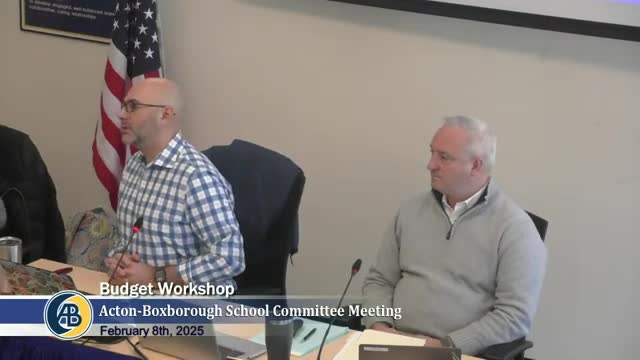Acton-Boxborough sets preliminary FY26 budget, approves small increase after debate over staffing cuts
Get AI-powered insights, summaries, and transcripts
Subscribe
Summary
The Acton-Boxborough Regional School Committee voted unanimously to set a preliminary fiscal 2026 budget and assessments, after presentations on district finances and contested staffing reductions that members and community speakers warned will cut student-facing supports.
The Acton-Boxborough Regional School Committee voted unanimously on Saturday to set a preliminary FY2026 operating budget of $116,791,164 and initial town assessments of $79,959,269 for Acton and $16,824,370 for Boxborough, with no use of the district's Excess & Deficiency (E&D) reserve, the committee said.
The vote establishes a budget ceiling the committee will return to in March for final action. "So, by noon, we are going to have a preliminary budget vote," Peter said during opening remarks. The motion, made later by Leila and seconded by Tori, included language directing that any additional state revenue the district receives up to $150,000 be applied to reduce town assessments rather than be retained in E&D.
Why it matters: The preliminary budget sets the maximum the district may ask the towns to fund for the coming year and frames school committee and town deliberations over the next month. Committee members, administrators and community members spent the day reviewing a budget that administrators said tries to hold to a roughly 3% guideline while closing a roughly $1.9 million gap through a mix of savings, one-time items removed from the base and staffing changes.
Administrators said the draft budget reflects a constrained fiscal picture: rising health insurance costs (shown in presentations as about a 14.8% increase from current plan projections), higher utilities, and continued enrollment shifts resulting in greater concentrations of students with higher needs. Sherry, the district finance presenter, told the committee the governor's budget proposal would add roughly $500,000 of state revenue compared with the preliminary estimate used to build the budget, but that the district also faces additional costs that reduce the net benefit to about $120,000.
Committee members and community speakers pressed leaders to preserve student-facing positions, and several warned that proposed reductions would hit special education, intervention and elementary assistant roles. Andrew Shen, deputy superintendent, outlined proposed staffing changes embedded in the draft budget: reductions totaling about 19 full-time-equivalent positions districtwide, including classroom teaching reductions at the junior high and high school, a shift from a certified librarian to a library media assistant, reductions in elementary general education assistant hours (a 25% cut proposed), and the elimination of one elementary special-education coordinator position at the district level. The district proposed adding a 0.3 FTE BCBA at the high school and a special-education assistant at the elementary level to address specific needs.
Administrators emphasized legal and program constraints. Mary Emmons, interim director of special education, said the district continues to place most students in inclusive settings and that many students placed out of district have complex needs; she said leaders sought to avoid cuts to direct student services where possible. Mary Anne Young, multilingual coordinator, described rapid growth in multilingual learners and said current staffing (about 16.6 FTEs for ELD services) leaves unmet needs in state-recommended minutes for English-language development.
Community reaction: Multiple teachers and parents urged the committee to reverse reductions that they said would remove critical leadership and front-line supports. "This is absolutely a student-facing position," a McCarthy Town teacher said of the elementary coordinator role under discussion, arguing the coordinator is regularly in classrooms and working directly with students and staff. Finance committee and select board members from both towns expressed concern about assessment impacts on residents but said they hear urgency to preserve core services.
Votes at a glance: The committee approved the preliminary FY2026 budget of $116,791,164 and the accompanying town assessments (Acton $79,959,269; Boxborough $16,824,370). Motion by Leila (last name not specified), second by Tori (last name not specified). The vote was recorded as unanimous; a roll-call list of committee members voting was not read into the record during the meeting transcript.
What comes next: Administrators told the committee they will refine the recommended budget and return March 13 with a recommended budget and March 20 for final adoption. The committee also directed that any additional state aid received before final adoption be used first to reduce the town assessments back toward prior levels; administrators said any additional state revenue beyond that would then flow to reserves.
Ending: Committee members scheduled a workshop in April to consider longer-term structural options if the district must live with lower resources and higher student needs over multiple years. "We have to really take some time'do some inflection and talk about is it time to think about reorganizing ourselves differently?" Peter said near the end of the session.
